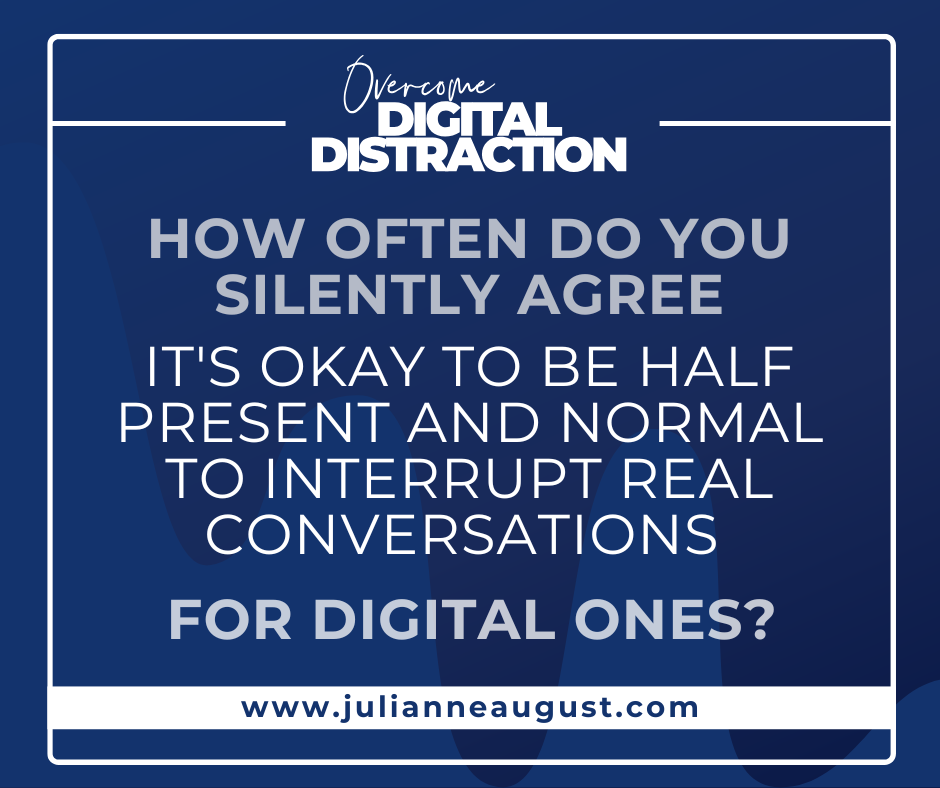Screen Time Personality Quiz
Discover Your Pathway to Digital Peace.
TAKE THE QUIZ
Guide to
Grayscale
MAKE YOUR PHONE LESS ADDICTIVE IN SECONDS.
DOWNLOAD
DOWNLOAD
Your screen can become a tool for encouragement.
Wallpapers for Desktop & Phone
Hey, I’m Julianne!
Christian Coach, encourager, digital distraction disruptor. I help people reduce their screen time, build life-giving habits, and stay focused on what matters most. The digital world isn’t going away, but your distraction can. So glad you’re here!
Welcome!

TELL ME MORE
Block Distracting Apps With One Quick Tap
Meet The Brick
July 1, 2025
23 | How Screen Time Affects Relationships and Is Quietly Destroying Your Connection (And What to Do About It)
“You’ve checked your phone four times since we sat down.”
Those words from someone I love hit like a cold splash of water. They stung because they were completely true. I was caught in a habit I barely even noticed, but the people closest to me definitely had. That uncomfortable moment opened my eyes to something I’d been blind to: screen time affects relationships in ways far deeper than we realize and it’s not just about individual phone habits, but about how our digital choices ripple through our most important connections.
Maybe you’ve been on either side of that moment. Perhaps someone gently called out your phone use during dinner, or you’ve sat across from someone whose eyes kept drifting to their screen while you were trying to connect. Either way, the tension is real and the stakes are higher than we often realize.
The Silent Agreement That’s Destroying Connection

What I’ve discovered through research and painful personal experience is that most of us are living by unspoken digital agreements that actually enable disconnection rather than protect our relationships.
Dr. Sherry Turkle, MIT professor and author of “Reclaiming Conversation,” calls this phenomenon “co-constructed absence” where we collectively create environments that normalize distraction. We silently agree that it’s okay to be half-present, that it’s normal to interrupt real conversations for digital ones.
Think about these scenarios:
- Your spouse scrolls during movie night, so you pull out your phone too
- Your friend checks a notification mid-conversation, so you take the opportunity to check yours
- Your family group chat expects immediate responses, creating anxiety if you don’t reply right away
- Your workplace culture demands 24/7 availability through digital channels
These aren’t just individual habits, they’re relationship dynamics that either fuel our phone dependence or help us break free from it. Understanding how screen time affects relationships is the first step toward creating healthier patterns.
The Research That Will Surprise You
If you’re married, here’s some eye-opening research: Scientists at the University of Washington studied 211 couples and found that 79% had never explicitly discussed their digital boundaries or expectations with each other. Think about that, nearly 8 out of 10 couples are navigating this digital world without ever talking about how technology fits into their relationship.
Instead, they developed unstated patterns that often enabled distraction rather than connection. But here’s the hopeful part: a 2023 study from Brigham Young University found that relationship satisfaction was 43% higher in couples who had explicitly negotiated their technology boundaries compared to those who hadn’t.
The way screen time affects relationships isn’t inevitable, it’s often the result of never having honest conversations about what we want our connections to look like.
Proverbs 27:17 tells us that “as iron sharpens iron, so one person sharpens another.” Our closest relationships have incredible power to shape us either toward distraction or toward being present. But this sharpening requires honest conversation and intention, not silent accommodation.
3 Ways to Recognize If Your Relationships Are Enabling Phone Addiction
Sometimes the people who love us most are unintentionally reinforcing the very digital habits that pull us away from them. And if we’re honest, we’re often doing the same to them. Here’s how to spot these patterns when screen time affects relationships:
1. The Expectation Check
What digital response expectations exist in your key relationships?
- Do certain people expect immediate text responses?
- Is there anxiety or tension when you don’t check work messages after hours?
- Are there unspoken rules about social media engagement with friends or family?
I noticed this in one of my close friendships. My friend would text during the day, and if I didn’t respond within 30 minutes, I’d get a follow-up: “Hey, is everything okay?” Without realizing it, we had created an unspoken expectation of constant availability, one that kept me tethered to my phone and responding out of obligation rather than genuine connection.
2. The Modeling Inventory
How are digital habits modeled and mirrored in your relationships?
- Does one person’s phone use trigger others to do the same?
- Are screens normal during meals, conversations, or family time?
- Do you feel permission to check your device when others check theirs?
There’s a beautiful passage in 1 Corinthians 11:1 where Paul says, “Follow my example, as I follow the example of Christ.” We’re all modeling something to those around us, the question is whether our digital habits are worth imitating.
3. The Support Assessment
Do your closest relationships support or undermine your digital boundaries?
- When you try to reduce screen time, do others respect this or make it harder?
- Is there subtle pressure to stay constantly connected?
- Do you feel the need to hide your efforts to disconnect?
Sometimes, and this might surprise you, even the people who love us most can unknowingly resist the changes we’re trying to make, especially when those changes disrupt familiar rhythms.
Dr. Gregory Jantz notes that “relationship systems often unconsciously protect the status quo, even when that status quo is harmful.” That means healthy boundaries can actually feel threatening, not just to us, but to those around us.
Grace-Filled Conversations That Change Everything
Once you’ve identified the relationship dynamics at play, the next step is having honest, grace-filled conversations about digital boundaries. This can feel vulnerable, but it’s essential for creating lasting change when screen time affects relationships in unhealthy ways.
Here are some conversation starters for different relationships in your life:
For Spouses/Partners: “I’ve noticed we both spend a lot of time on our phones when we’re together. I’d love for us to talk about how we can be more present with each other. What would feel good to you?”
For Parents and Children: “I want to create some family times where we can all be fully present together without devices. What activities would make that special for you?”
For Friends: “I’m trying to be more intentional about my phone use. Would you be open to having phone-free hangouts sometimes?”
For Work Colleagues: “I’m working on better work-life boundaries. I won’t be checking emails after 7pm, but I’ll always respond first thing in the morning. Does that work for your needs?”
Research from the University of Toronto found that the most successful digital boundary conversations focus on the positive gain (deeper connection) rather than the negative behaviour (too much phone use).
Remember, these conversations aren’t one-and-done. They’re ongoing dialogues as you navigate new patterns together. And they often work best when you acknowledge your own struggles rather than pointing fingers.
As Jesus reminds us in Matthew 7:3, we should be mindful of the “plank in our own eye” before addressing the “speck in our brother’s eye.” When it comes to digital habits, most of us likely have our own planks to deal with.
5 Powerful Ways to Create Connection Beyond Screens
One of the most effective ways to address how screen time affects relationships is to intentionally create shared offline experiences and activities that naturally invite connection and full presence without screens.
1. Screen-Free Dinners
Research shows that families who implement screen-free dinners report 37% better communication quality. It’s amazing what happens when we actually look at each other while we eat.
2. Nature Connection
Plan outdoor activities where phones naturally become less relevant, hiking, beach days, gardening together. The combination of relationship connection and nature has been shown to reduce screen cravings by 47%.
3. Creative Engagement
Try activities that occupy your hands and minds, cooking together, art projects, board games, building something. These activities naturally compete with the phone for attention and often create lasting memories.
4. Reading Rhythms
Create shared reading times where everyone has a physical book. This models focused attention while still being together. One couple I know puts on music and reads together after dinner, a simple but powerful practice. This could be a great kid friendly rhythm too!
5. The Accountability Partnership
Find one person who shares your desire for reducing screen time and check in weekly. Those with accountability partners are 68% more likely to maintain their boundaries long-term.
The key is consistency. One device-free dinner might not reshape your family culture, but a regular rhythm of presence-based activities gradually creates new norms and expectations.
Dr. Jean Twenge, author of “iGen” and leading researcher on generational differences, found that expectations around phone availability and response time vary widely between age groups. What feels respectful or normal to one person might feel disconnected or dismissive to another. This is why explicit conversations matter so much.

FAQ: Common Questions About How Screen Time Affects Relationships
Q: What if my spouse isn’t interested in reducing screen time? A: Start with your own boundaries and model the change you want to see. Often, when one person begins living more intentionally with technology, others naturally become curious about the peace and presence they observe.
Q: How do I set boundaries without seeming controlling? A: Focus the conversation on your own needs and desires rather than their behaviour. Say “I’d love more phone-free time together” instead of “You’re always on your phone.”
Q: What about work demands that require constant availability? A: Most “urgent” work communication isn’t actually urgent. Start by defining true emergencies and establish specific windows for checking work messages.
Q: How do I handle family members who resist digital boundaries? A: Be patient and consistent. Change takes time, and resistance often comes from fear of missing out or breaking familiar patterns. Keep inviting them into presence-based activities without making them feel judged.
Q: Is it normal that screen time affects relationships this much? A: You’re not alone. Research shows that 62% of people feel their relationships have been negatively impacted by excessive screen use. The good news is that awareness is the first step toward positive change.
Your Next Step Toward Deeper Connection
The relationships we nurture hold incredible power and they can either feed our digital distraction or cultivate spaces where we’re truly present with each other. When we start noticing these patterns, engage in honest conversations, and intentionally create offline experiences together, we shift from relationships that accommodate divided attention to ones that foster deep connection.
I invite you to have just one boundary conversation with someone close to you. Share your heart, listen to theirs, and take one small step toward creating a culture of presence in your home, workplace, or friendships.
Because at the end of the day, the people in your life are worth your full attention. They’re worth the uncomfortable conversations and the intentional choices to put the phone down and show up fully.
Small steps. Grace-filled conversations. Presence over perfection.
Ephesians 5:15-16 urges us to “Be very careful, then, how you live, not as unwise but as wise, making the most of every opportunity, because the days are evil.” In our digital age, living wisely means noticing how screen time affects relationships and choosing presence over distraction.
The beautiful thing about relationships is that they’re resilient. They can heal. They can grow stronger when we’re willing to show up differently. I’m cheering you on in this transformation.
Ready to reclaim your focus and restore peace in your relationships? Take my free Screen Time Personality Quiz to discover your unique digital distraction patterns and get a personalized 3-Day Digital Peace Plan.
Want to dive deeper? Listen to the Overcome Digital Distraction Podcast for more strategies on breaking free from screen addiction. Be sure to follow the show!
Get Brick: A Tiny Digital Wellness Device. You just tap your iPhone to it, and it activates a custom focus mode you’ve already designed. Tempting apps? Blocked. Helpful ones? Still accessible. Want to learn more or try Brick yourself? Get 10% off with my link here: https://julianneaugust.com/brick
Let’s Connect!
Leave me a voice message with your thoughts or questions via Speakpipe below!
📩 Email: hello@julianneaugust.com
📱 Instagram: @julianne.august
📘 Facebook: Julianne August
🌐 Website: julianneaugust.com
Leave a Review
Has the podcast helped you create healthier habits?
If you’ve learned something that’s making a real difference in your life, I’d love to hear about it! Your review not only encourages me but also helps others find this podcast and start their own journey to overcome digital distractions. I read every single one and truly appreciate your support!
WRITE A REVIEW ➞
TAKE THE QUIZ ➞
Learn to declutter your digital life, set healthy boundaries, and create spaces of rest.
Ever wonder what’s really fueling your screen habits? This quiz will help you find out! It’s quick, fun, and packed with insights to help you tackle distractions head-on. Your results will show you exactly where to start.
Take the free
Screen Time Personality Quiz!
GET THE FREE GUIDE ➞
The Simple Step to Reduce Screen Time
Imagine your phone fading into the background and notifications no longer grabbing your attention, social media feeling less tempting, and your mind finally free to focus on what truly matters. That’s the power of grayscale. It’s a simple but powerful shift.
Make Your Phone Less Addictive in Seconds
Your Guide to Grayscale will help you experience it for yourself!
DOWNLOAD ➞
Grab the encouraging
wallpapers for phone and desktop.
From uplifting Bible verses to truth-filled identity reminders, and even just-for-fun designs, these wallpapers are a great way to stay grounded throughout your day. Choose from 8 desktop and 8 phone designs.
MEET THE BRICK ➞
What if there was an actual wall between you and digital distraction? Not another screen time limit you can easily ignore, but a physical barrier that makes mindless scrolling nearly impossible. After 30 days of testing, I've found the tool that finally works: The Brick.